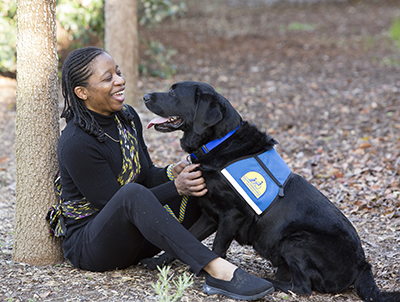
SANTA ROSA, Calif. – The results of an important research study completed by the Department of Veterans Affairs (VA) shows significant benefits from service dogs for veterans with post-traumatic stress disorder (PTSD). The results are staggering: Veterans paired with service dogs showed less suicidal ideation and more improvement in mental health than those paired with emotional support dogs.
- The VA estimates 20-30% of veterans live with PTSD.
- According to the VA Suicide Prevention Annual Report, nearly 18 service members take their own lives each day as a result of these internal scars.
- Despite the prevalence of PTSD within the VA population, relative to other mental health conditions, existing treatments tend to be less effective.
- Veterans also die by suicide at a rate 50% higher than the non-veteran adult population.
Canine Companions, the first and largest provider of service dogs, was one of three organizations selected to participate in the VA study as a provider of trained service and emotional support dogs, and at the conclusion of the study in 2018, was the last provider organization still involved. Over the course of the four-year study, Canine Companions placed a total of 99 dogs with veterans with PTSD.
“The importance of this study cannot be overstated, especially for the veterans seeking help for symptoms of PTSD,” says Canine Companions CEO Paige Mazzoni. “Service dogs provide a significant therapeutic benefit for veterans with PTSD.”
Based on the positive study findings, the VA will allow veterans with PTSD and other mental health diagnoses to be eligible for the VA service dog veterinary insurance benefit, which also covers equipment and travel expenses associated with service dog ownership.
“We applaud the decision to expand crucial financial assistance to veterans with PTSD through the VA service dog veterinary insurance benefit program,” Mazzoni states.
Although the VA has long provided financial support for service dogs for veterans with certain physical conditions, the unseen wounds of war and the service dogs that can assist with those wounds through physical tasks, did not garner its support until now.
Importantly, veterans with service dogs eligible for the insurance program find navigating the benefit program confusing – full of roadblocks that make giving up these benefits more attractive than jumping through hoops to get the financial assistance they deserve.
Chelsey Darrow, Canine Companions’ veteran programs specialist, oversees training and follow up with Canine Companions veteran clients, including educating them on the process to receive veterinary insurance benefits from the VA. “The process can be difficult for veterans to navigate. I guide them through the steps and often end up speaking to VA providers who are unfamiliar with the benefit. While the insurance the VA provides is fantastic, getting it can be extremely stressful, particularly for veterans dealing with PTSD.”
Service dogs are trained in PTSD-mitigating tasks including turning on lights, creating a buffer in public, anxiety and nightmare interruption. VA Study participants were given the opportunity to transition to formal Canine Companions graduates after they exited the 18-month study observation period, complete with free ongoing follow up services.
VA study personnel share, “Canine Companions demonstrated the highest level of expertise in pairing service dogs with veterans and has gained extensive experience interacting with veterans with PTSD, who can require special consideration in pairing schedules and pairing strategies. They are a trusted leader in the service dog community.”
Learn more about Canine Companions Veterans Initiative at canine.org/veterans.
